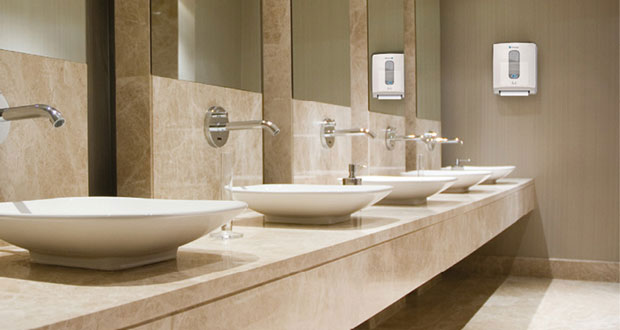Paul Mulready, Marketing Manager at Northwood Hygiene Products offers advice on how to factor sustainability into running a washroom
To lower the carbon footprint of a washroom, we need to consider a multitude of factors, such as reducing energy or water consumption, cutting the number of virgin fibres used in paper products, using 100 per cent recyclable packaging, choosing eco-friendly consumables, and reducing the distance that products have to travel.
This can be challenging as large volumes of soap, water, toilet tissue and hand towels are used in washrooms every day. Furthermore, energy is required to heat and light these spaces and power units, such as dryers.
Offering visitors a greener washroom experience reassures them that a company is doing its best to be responsible. Signposting the use of sustainable products, reducing waste, limiting consumption and recycling used products all clearly show visitors that the organisation is committed to making a positive contribution.
Controlled dispensers that limit the use of consumables like soap and paper towels are a must. Not only do they help to cut costs, they also significantly reduce waste and are therefore more environmentally sustainable. Dispensers that release one length of paper or one shot of soap at a time naturally limit consumption and contribute to sustainability.
Dispensers that minimise runouts of consumables contribute to achieving good standards of hygiene and help the washroom to be managed more efficiently and sustainably. High-capacity systems for soap and paper will help to prevent products depleting and reduce the need for maintenance staff to check stock levels, which all contributes towards efficiency and sustainability.
The way a disposable product is dispensed is important in helping to promote hygiene and minimise the impact on the environment. Dispensers that are sealed, and splash-proof keep products safely stored inside, helping to prevent the contents becoming contaminated and ultimately wasted.
RESPONSIBLY SOURCED
Thinking sustainably, providers should ensure that paper products are made only from raw materials that have been responsibly sourced – either from recycled materials or from sustainably managed forests.
Jumbo toilet rolls are often used in high footfall washrooms, and while they offer high capacity, they do need to be checked to ensure the paper has not run out. Maintenance staff may be tempted to replace a roll before it is completely finished to avoid having to go back to replenish it, but this can drive up paper costs and waste product, which is not good for the environment.
A high capacity, dual roll toilet roll system in a locked dispenser is a sustainable, hygienic and efficient solution. There are dispensers available that restrict use to one roll at a time to deliver cost savings, reduce waste and help the environment.
Sealed soap cartridges are more sustainable than bulk fill soaps, which can be messy and time consuming to fill. Foam soaps generally use less product compared to liquid soaps and they are quick to lather, which reduces the amount of water required for handwashing.
When choosing washroom suppliers, FMs should also scrutinise the supply chain itself. Are your partners environmentally responsible? Do they work to offset or reduce their carbon footprint? How sustainable are their logistics?
FMs can significantly reduce the environmental impact of a washroom by taking a more holistic approach and working with partners that concentrate on manufacturing, delivering and recycling products in the most sustainable way.





